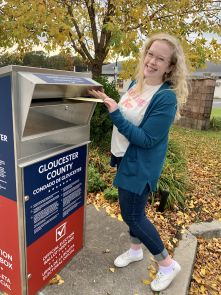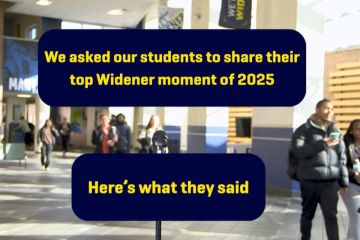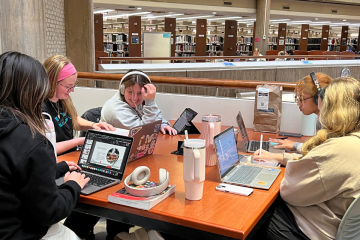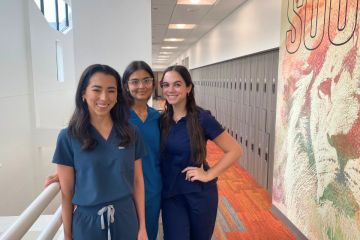Ready, Set, Vote

To hear Megan Sharp talk about the 2020 election, you wouldn’t know this is the first time she’s eligible to vote in a presidential race.
“I’ve never seen so many young people passionate about political and human rights issues,” Sharp said.
“From the racial tension in the country to COVID-19 to climate change, there’s so many different issues that a lot of young people are frustrated about, and we’re trying to get students to realize that they can channel that frustration at the polls.” —Megan Sharp '23
Sharp, a sophomore criminal justice major with minors in political science and legal analysis, is serving as the political engagement coordinator for Widener’s Center for Civic & Global Engagement (CCGE) during a time when the engagement of every single student voice is critical.
Cultivating attributes of responsible citizenship has long been a hallmark of a Widener education, and exercising the right to vote is a vital part of that. Widener administration, faculty, student groups, and community partners are joining national and state campaigns to not only encourage students to vote, but to prepare them to engage with complex societal issues to become lifelong active citizens.
Widener’s student voter turnout in the 2016 election exceeded national turnout by about 10 percent, and also exceeded the mean turnout rate among Carnegie private research institutions by nearly 14 percent. The overall voter registration rate for students was an impressive 85 percent in the 2016 election, though Sharp is ready to see all eligible students exercise their right to vote on Nov. 3.
“We have so much power in our vote, whether we believe it or not. A lot of people don’t think that their vote really matters but I do believe that voting is the greatest power we have as regular citizens to make a big difference in our government and in the way our country is run,” Sharp said.
An Event for Everyone
With students coming from numerous states with unique voter policies and deadlines plus a pandemic to contend with, increasing student voter engagement requires collaboration across academic departments, extracurricular activities, and community institutions.
But students like Sharp and the faculty, staff, and community partners of the Political Engagement Planning Committee (PEPC) are leaving no stone unturned in the effort to engage students by meeting them everywhere they are.
Through signature freshman programming like the First Year Experience and Learning Communities, new students have been exposed to voter education presentations in remote classrooms and virtual residence spaces. Voter registration has also been directly added into some course syllabi and two courses this semester. SSCI 120: Engaged Citizenship and SSCI 202: Current Issues in Political Engagement are devoted solely to issues of voter registration and education.
In addition, a number of virtual extracurricular activities have been hosted by the PEPC, CCGE, and the Engaged Citizenship course to build community and knowledge on voter issues.
Students have gathered for virtual debate watches facilitated by Professor James Vike, executive team member of the PEPC and professor of political science, that featured live chats during the debate followed by breakout discussion groups after the event. Vike also gave a well-attended open lecture on the history and process of the electoral college.
Empowered Voices, Educated Votes
For National Voter Registration Day on Sept. 22, a “couch party” was hosted to unite students and inform them on the process and importance of registering in advance to vote.
While Zora DeSeignora, a sophomore exploratory studies major, has been looking forward to voting for most of her life, attending the couch party gave her new insight into just how far one vote can reach.
“At the couch party, a social work student was telling us that while some people don’t want to vote because they don’t feel like either party caters to them, they don’t realize their vote also helps someone else. Which candidates are going to help out veterans, which candidates will support undocumented people who can’t vote? That put a lot into perspective for me,” DeSeignora said.
As a Pride Service Site Leader, DeSeignora is passionate about volunteering in her community, and voting is an act of civic engagement she hopes all students get involved in.
“As an African American woman, I think about all the people that had to fight for me to get the right to vote, and some people even died for me to have this right. I feel blessed to have this opportunity because if it wasn’t a big deal, then why did people have to fight so hard for it?” —Zora DeSeignora '23
DeSeignora feels empowered by the voter education she’s receiving in her media ethics class, through the CCGE, and from other students around the university, and hopes her peers feel energized too.
“I feel like I’m a part of history and also that I’m voting for the future I want. We’re young but one day we will be in positions of power like the candidates we’re voting for. I’m realizing as a student and a young person just how much power my voice has and how much ability I have to change the world,” she said.
The multi-faceted approach Widener has taken to register and inform student voters has ensured that despite students’ majors and interests, there are a host of resources available to give them the tools and information necessary to become educated voters.
“I’d encourage all my fellow students to use their voices to go out and vote in this election. Don’t let people tell you it doesn’t matter, because every single vote matters," DeSeignora said.




